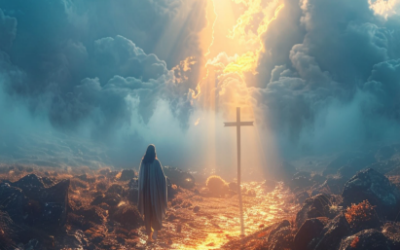John 12 presents a clear and compelling testimony that Jesus is YHWH (Yahweh, Jehovah), the one true God of Israel. After describing Jesus triumphal entry into Jerusalem and Jesus predicting His own approaching death, John goes on to explain:
“But though He had performed so many signs before them, yet they were not believing in Him. This was to fulfill the word of Isaiah the prophet which he spoke: ‘Lord, who has believed our report? And to whom has the arm of the Lord been revealed?’ For this reason they could not believe, for Isaiah said again, ‘He has blinded their eyes and He hardened their heart, so that they would not see with their eyes and perceive with their heart, and be converted and I heal them.’ These things Isaiah said because he saw His glory, and he spoke of Him,” (John 12:37-41).
John explains the unbelief of the Pharisees as the fulfillment of Isaiah’s prophecies. The passage is clearly talking about Jesus; “though He had performed so many signs before them, yet they were not believing in Him.” It was Jesus performing signs throughout John, and it was Jesus in whom they did not believe. Reading the earlier portion of the chapter leading up to this makes it even clearer. Jesus is definitely the subject here. When John further says, “These things Isaiah said because he saw His glory, and he spoke of Him,” the context is still Jesus. Isaiah saw Jesus’ glory and spoke of Jesus. Isaiah’s words are fulfilled in the Pharisees’ rejection of Jesus because those words were about Jesus. It doesn’t get much more straightforward than that. But when we consider Isaiah’s words in context, the implications are powerful, and John’s point is unmistakable.
John quotes from two passages here. First, he cites Isaiah 53:1. Isaiah 53 is one of the most powerful Messianic prophecies in the Old Testament and describes how Jesus would be rejected and, though sinless Himself, would be put to death for our sins. It even points to His resurrection afterward. This passage, however, is not describing a vision in which Isaiah sees the Messiah. He speaks about Jesus, but He does not see Jesus’ glory in this chapter. This brings us to the second reference. John also cites Isaiah 6:10. In this passage, Isaiah is describing a rather extraordinary visionary experience at the beginning of His prophetic ministry. The chapter begins:
“In the year of King Uzziah’s death I saw the LORD sitting on a throne, lofty and exalted, with the train of His robe filling the temple. Seraphim stood above Him, each having six wings: with two he covered his face, and with two he covered his feet, and with two he flew. And one called out to another and said, ‘Holy, Holy, Holy, is the Lord of hosts, The whole earth is full of His glory.’ And the foundations of the thresholds trembled at the voice of him who called out, while the temple was filling with smoke,” (Isaiah 6:1-4).
The rest of the chapter describes Isaiah’s experience in the LORD’s presence. The word “LORD” in this context represents the divine name YHWH (Yahweh, Jehovah). This is the glory that Isaiah beheld which compelled him to write these words. He had seen the glory of the LORD, God of Israel! In fact, in the Septuagint (the ancient Greek translation of the Old Testament that was used by most of the New Testament writers) the opening line of the chapter reads:
“And it happened in the year that King Uzziah died that I saw the Lord sitting on a throne, lofty and raised up, and the house was full of His glory,”
Note that, while the Hebrew text says that “the train of His robe” filled the temple, the Septuagint interprets this as “His glory” filling the temple. When John says that Isaiah wrote Isaiah 6:10 because he had seen “His glory,” this is taken straight from the passage itself. Isaiah had seen the glory of the LORD and wrote what was told to him. John, however, clearly says that Isaiah wrote these words because He had seen Jesus’ glory. John is, therefore, unambiguously saying that Jesus is the one who Isaiah saw in glory in his temple vision. Thus, John is saying that Jesus is the LORD. He is saying that, when God appeared to the prophets, it was not the Father they saw but Jesus. Just as He said earlier in the Gospel:
“No one has ever seen God, but the one and only Son, who is himself God and is in closest relationship with the Father, has made him known,” (John 1:18, NIV).
Even in choosing the title “the Word” for Jesus (John 1:1-14), John was using rich language from Jewish tradition to define Jesus as God’s personal, self-revealing presence.1 John also describes Jesus as being both with God and yet being God Himself (John 1:1),2 as the uncreated creator of all things (John 1:3), and as coming down from heaven to the Jews as His own people (John 1:11). All of this makes it clear that John understood Jesus to be the LORD, Yahweh, Jehovah God. It also shows the careful distinction John made. While Jesus and the Father are both the one true God of Israel, Jesus is not the Father. Jesus and the Father are distinct persons and yet both the one, eternal God. Thus, the gospel of John makes sense only in light of the biblical doctrine of the Trinity.
References
| 1↑ | See our article “Why is Jesus called the Word?“ |
|---|---|
| 2↑ | see our article “The Word and The Watchtower: An Exegesis of John 1:1“ |






